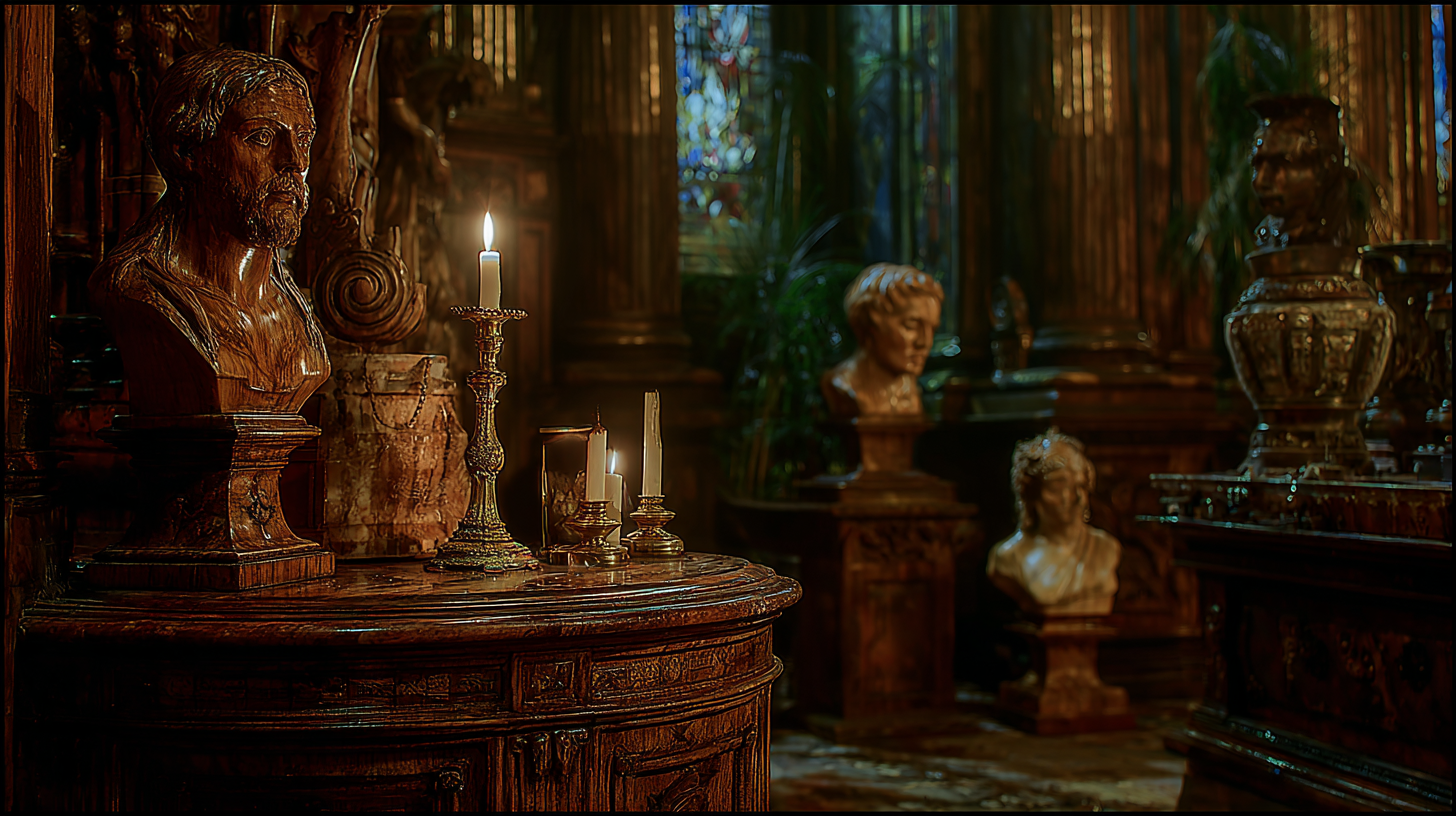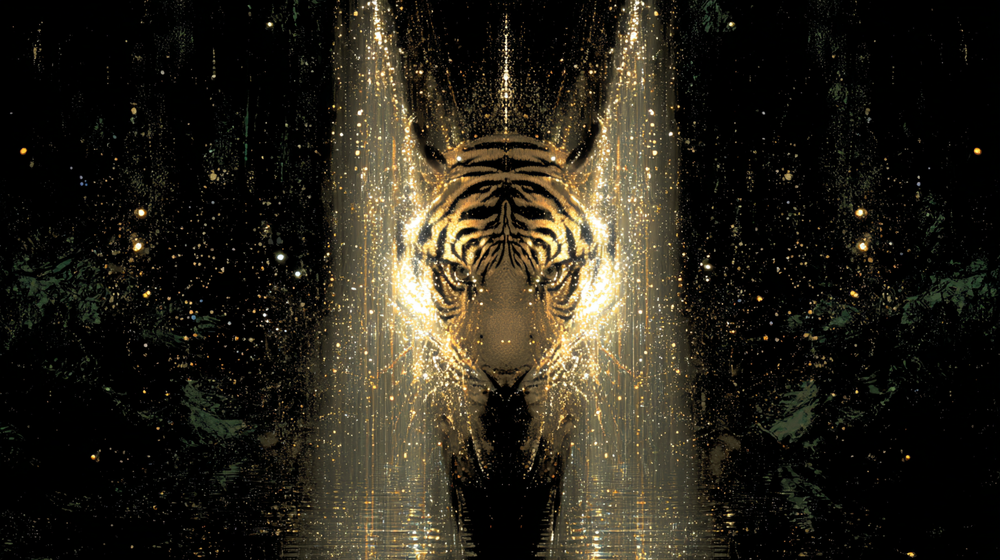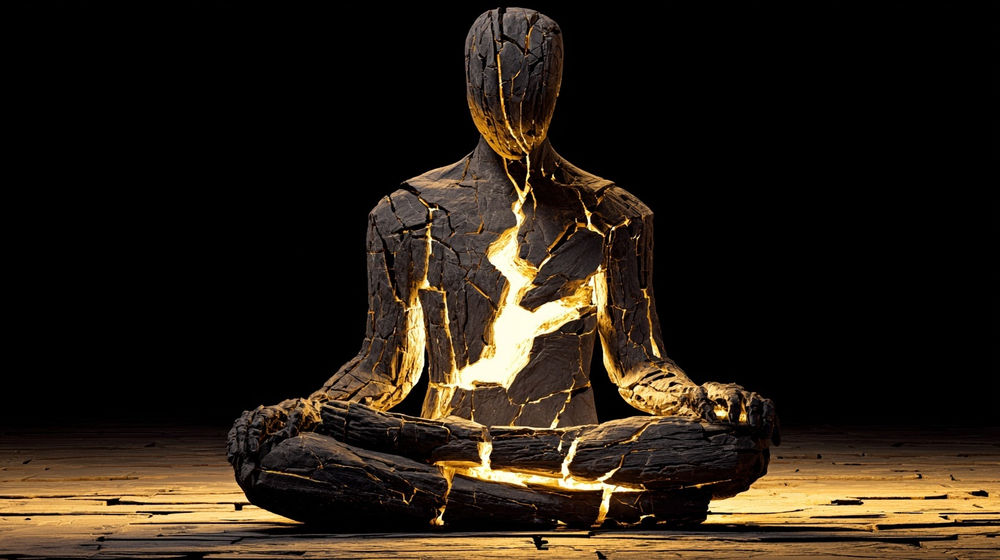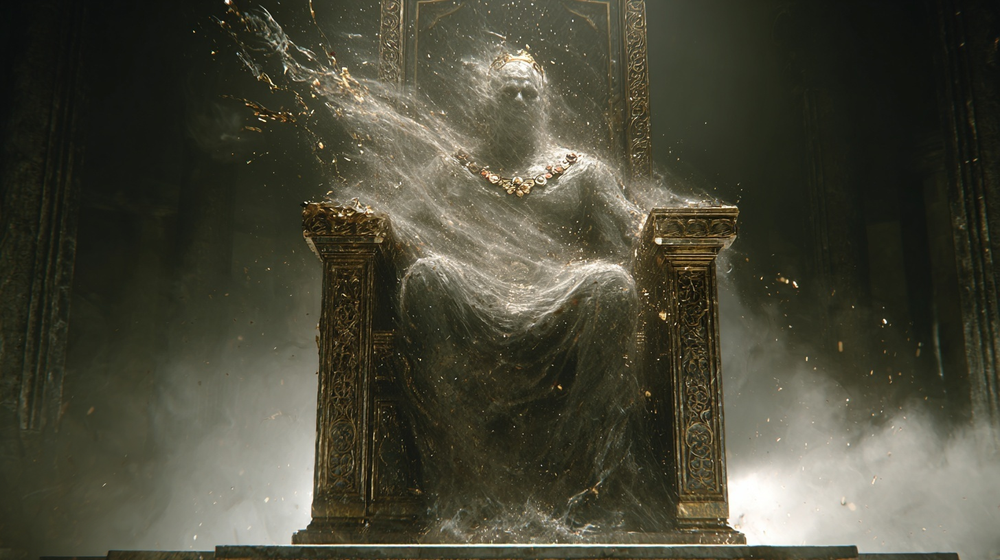Episode 4: The Lodge

Introduction
Before a king becomes a tyrant, he is first a man. Before he builds a fortress around his kingdom, he builds a fortress around his soul. The sickness of the Hollow Senex—the rigid, soulless authority who rules by fear—does not begin on the throne. It starts in the quiet, desperate moments of a life perfected on the surface but hollowed out within. It begins with a choice: the choice between the sterile safety of a perfect prison and the dangerous, vital wilderness where the soul resides. This choice is the subject of today's parable: The Lodge.
The Parable
There was once a man who had created the most exceptional lodge in the middle of a magnificent forest. As the man stood in his abode, he noted how everything in the lodge was ornate and in order; doubtless, nothing was lacking. In this moment, he realized his wife was missing. He rushed out of the back of the lodge, looking in every direction. He approached a wooden fence, which clearly demarcated the boundary of his property. As he got further from the lodge in search of her, he could feel the presence of three large bears. In this moment, he ran swiftly back into the lodge and closed the heavy wooden doors.
Reflection Questions
- First... What is your "Lodge"? What part of your life—your career, your home, your belief system—have you made "ornate and in order" to feel safe and in control?
- Second... What essential part of you is missing from that perfect construction? What is the "wife," the Anima, the vital, feeling part of your soul that cannot survive in that sterile environment?
- And finally... What are the "bears" that guard the path to your wholeness? What are the raw, instinctual fears—of failure, of chaos, of vulnerability—that keep you locked safely inside, but tragically alone?
Transcript
Welcome to The (all) Unknowing. Let us hold a candle to the path and see what reflections await us in the mirrors of the mind.
In our last episode, we explored the fundamental law of the Shadow—how every bright certainty creates its proportional darkness, how our rigid light creates the very blindness we fear. We saw how the Hollow Senex comes to be: a man so identified with his external light that he cannot face the shadow it casts.
But there is another path to becoming hollow, perhaps even more tragic. It's not just about shadows we won't face—it's about the soul we won't seek. It's about what happens when we perfect our lives so thoroughly that there's no room left for life itself.
Before a king becomes a tyrant, he is first a man. Before he builds a fortress around his kingdom, he builds a fortress around his soul. Today we witness that construction—and its terrible cost. This is the parable of The Lodge.
There was once a man who had created the most exceptional lodge in the middle of a magnificent forest. As the man stood in his abode, he noted how everything in the lodge was ornate and in order. Doubtless, nothing was lacking.
In this moment, he realized his wife was missing.
He rushed out of the back of the lodge, looking in every direction. He approached a wooden fence, which demarcated the boundary of his property. As he got further from the lodge in search of her, he could feel the presence of three large bears.
In this moment, he ran swiftly back into the lodge and closed the heavy wooden doors.
The parable ends there, in that terrible silence. The man is safe in his perfect lodge. His wife—his soul—remains lost in the forest. And the doors are barred.
This is the Cancer of Eros made manifest—the disease of severed relatedness, of life perfected into death. The man has achieved what the ego dreams of: complete control. Everything is ornate and in order. A triumph of the rational mind's ability to create safety, beauty, and perfect organization.
But the Anima—his wife, his soul, the feminine principle within—cannot breathe in such sterility. She belongs to the magnificent forest, the untamed wilderness of the psyche, where life is dangerous but real, chaotic but vital. The soul needs wildness the way lungs need air. In the antiseptic perfection of the lodge, she suffocates and flees.
This man has become the rich fool of the ancient parable, who said to himself: "I will pull down my barns and build greater, and there I will store all my crops and my goods. And I will say to my soul, 'Soul, you have many goods laid up for many years; take your ease; eat, drink, and be merry.'"
But God said to him: "Fool! This night your soul will be required of you."
Listen carefully—this isn't a threat of physical death. It's a diagnosis of spiritual death. The soul is "required"—it must leave—because it has no function in a completed world. When there's nothing left to seek, no reason to venture beyond your walls, no need for relationship or growth or becoming—the soul dies. Or flees.
The rich fool thought he could command his soul to be satisfied with stored goods. The lodge man has discovered the soul's answer: she abandons the prison of perfection for the forest of possibility.
And then come the bears. Three of them, waiting at the property line. These are the guardians of the threshold—the powerful, instinctual forces that stand between the ego and the soul. To reach his wife, the man would have to face these terrifying aspects of his own deeper nature. The wild, the unpredictable, the uncontrollable. His own repressed instincts, his shadow, his unlived life.
This is the moment of choice that defines everything. The call to adventure stands before him: leave safety, face the bears, reclaim your soul. Or retreat into the beautiful prison you've built.
He chooses the prison.
Watch how the Hollow Senex is born—not through evil, but through refusal. The refusal to risk. The refusal to grow. The refusal to choose soul over structure. He runs back and bars the door, and in that moment, he becomes what we met in our second episode: the rigid authority who cannot be questioned, who cannot admit fault, who cannot bear to look in the mirror.
Why? Because he has chosen his lodge over his soul. He has chosen the ornate and ordered over the vital and wild. And now he must defend that choice forever, must insist his prison is a palace, must force everyone else to admire his empty perfection—because to admit the truth would be to admit he traded his soul for safety.
The Shadow episode showed us how brightness creates blindness. The Lodge shows us something worse: how perfection creates death. Not physical death—spiritual death. The death of relatedness, of growth, of becoming. The man stands in his ornate lodge, everything in order, nothing lacking—except everything that matters.
The tragic irony cuts deep: he built the lodge presumably FOR his wife, for their life together. But the very perfection of his creation drove her away. This is the ego's great delusion—that if we can just make everything perfect enough, safe enough, controlled enough, then happiness will follow. But the soul doesn't want perfection. It wants aliveness.
How many of us live in our own lodges right now? Our perfect careers that feel like coffins. Our controlled relationships drained of passion. Our rigid belief systems that admit no mystery. We sense something essential is missing—some vitality, some wildness, some SOUL—but we're too terrified to venture past the fence.
Because we know the bears are out there. The challenges. The uncertainties. The parts of ourselves we've repressed to maintain our perfect order. And so we retreat, close the heavy doors, and pretend that safety is the same as life.
This parable is a warning and a diagnosis. You can perfect your life right into spiritual death. You can organize your existence so thoroughly that existence itself flees. You can build a fortress so impenetrable that even your own soul cannot enter.
But it's also an invitation—though that invitation must wait for our next episode. For now, we must sit with the diagnosis, feel the weight of those closed doors, and hear the silence where the soul's voice should be.
The questions from this mirror require tremendous courage to answer honestly:
First... What is your lodge? What part of your life have you made "ornate and in order" at the cost of vitality? Where have you chosen control over connection, safety over soul?
Second... What essential part of you has fled that perfect construction? What is your "wife"—the feeling nature, the creative force, the wild wisdom—that cannot survive in your sterile environment?
And finally... What are the bears that guard the path to your wholeness? What terrifies you so much that you would rather live in beautiful emptiness than face it? And how much longer can you bear to live without your soul?
Next time, we will explore what happens when someone finds the courage to face those bears—to leave the lodge and seek what's missing, no matter the danger. We will discover what weapon one needs for such a journey. Spoiler: it's not what you think.
But for now, sit with this mirror. Feel the weight of those closed doors. Hear the silence where your soul's voice should be. And ask yourself: is your ego's safety worth your spiritual death?
Contemplate that. And we will meet again.
Go well on the path of unknowing.
A Deeper Look: A Guide to the Mirror
This parable is a profound study of the modern ego's Pyrrhic victory. It diagnoses the specific spiritual sickness that results from perfecting the external world at the cost of the internal one. Below are three layers of analysis to help illuminate its reflection.
The Heart of the Story
A man builds the PERFECT house in the forest. Everything is fancy and exactly where it should be. But then he realizes his wife isn't there. She's missing. He runs outside to look for her, but as he gets close to the edge of his yard, he senses three big, scary bears out in the wild forest. He gets so scared that he runs back inside his perfect-but-empty house and locks the door, choosing safety over his soul. The parable shows how we often build perfect lives that are empty inside because we're too afraid to go into the "scary places"—our own inner wilderness—to find what's truly missing.
The Archetypal Framework
This parable is a map of the soul's refusal to grow, and the birth of the Hollow Senex.
- The Lodge as Fortified Ego: The perfect, ornate lodge represents the hyper-rational ego (Logos) that has created a successful persona but has walled itself off from the unconscious, from feeling (Eros), and from the soul. It is a beautiful prison.
- The Anima's Exile: The wife is the Anima, the soul. Her absence is not an event but a condition. She cannot live in the sterile lodge; her natural habitat is the "magnificent forest" of the untamed psyche. Her absence is the direct cause of the man's spiritual emptiness.
- The Bears as Guardians of the Threshold: The bears are the terrifying aspect of the unconscious. They represent the raw, instinctual power the ego has repressed. To reach the Anima, the man must confront these powerful, chthonic energies. They are the guardians of the path to wholeness.
- The Refusal of the Call: The man's swift retreat is the central tragedy. He is given the call to adventure—the quest to find his soul—and he refuses it out of fear. This refusal is the defining choice that creates the Hollow Senex, a man who will now forever be defined by the defenses he builds against his own depth.
The Eastern Framework: The Prison of Ahamkara
This parable is a precise map of a consciousness trapped by its creations, a core theme in Hindu philosophy. It details the tragedy of the individual soul identifying with the ego at the cost of its divinity.
- Ahamkara (The Lodge as Ego-Fortress): The perfect, ornate lodge is a manifestation of Ahamkara, the ego-sense or "I-maker." It is the constructed, false self that believes its structures and achievements are the totality of reality. The man's pride in his lodge is the classic trap of the ego admiring its own beautiful, but ultimately lifeless, prison.
- Shakti (The Exiled Soul): The missing wife is Shakti, the divine feminine, the active, animating life-force of the universe. The parable shows that Shakti cannot be contained within the sterile, rigid confines of the ego (Ahamkara). Her natural home is the wild, untamed forest. The man's feeling of emptiness is the direct result of a consciousness (Shiva) that has become severed from its creative energy (Shakti).
- Prakriti (The Forest of the Real): The magnificent forest is Prakriti, primordial, untamed nature. It is the raw, living reality that exists beyond the ego's control. While the man sees it as a threat, it is the true home of the soul and the source of all vitality.
- The Choice of Adharma: The man's retreat back into the lodge is a conscious choice for Adharma—a life out of alignment with his soul's true purpose. He chooses the bondage (Bandha) of his perfected ego over the difficult path of Moksha (liberation), which would require him to face the terrifying aspects of Prakriti (the bears) to reunite with his Shakti. He chooses the safety of the illusion (Maya) over the horrifying reality of his wholeness.
The Deeper Philosophical Framework
The parable diagnoses the spiritual sickness that results from a pathological split between the ego and the Self, a core feature of the Cancer of Integration.
- A Failure of "Dwelling": In Heideggerian terms, the man has built a structure but does not truly "dwell" within it. Dwelling requires a harmonious relationship with the world (the forest) and an authentic way of being (with the soul/Anima). The lodge is a monument to his alienation from both.
- The Origin of the Cancer of Eros: This is a clinical depiction of the birth of this pathology. The man has achieved perfect order at the cost of all relatedness. His life is without soul, feeling, or vitality because he has created an environment hostile to the very principle that carries them.
- The Terror of the Repressed Self: The man's terror is the ego's existential fear of dissolution in the face of the larger psychic reality it has disowned. He prefers the known emptiness of the ego-complex to the terrifying wholeness of the Self. This choice—to remain a defended fragment rather than risk becoming whole—is the foundational wound of the modern psyche. The parable ends in a state of paralysis because, for many, this refusal is not a single event but a permanent state of being—a life defined by the terror of the inner quest.
- The Completion as Death: The biblical rich fool reveals the ultimate horror—storing up goods isn't preparation for living, it's the creation of spiritual death. 'Soul, you have many goods laid up for many years'—but the soul doesn't want goods, it wants growth. It doesn't want safety, it wants seeking. The moment the ego declares its project complete ('take your ease; eat, drink, and be merry'), the soul recognizes there's nothing left for it here. When God says 'This night your soul will be required of you,' this isn't punishment—it's simply naming what has already occurred. The soul is 'required' to leave because it has been made obsolete by perfection. The lodge man experiences this not as sudden divine judgment but as slow abandonment—his soul slipping away to find the wilderness where life still moves, where bears still threaten, where growth is still possible.
In short, The Lodge serves as a chilling diagnosis of a life perfected into spiritual death. It teaches that the ego’s most significant achievement—a world of ornate safety and absolute control—is the soul’s most desolate prison. Ultimately, it is a stark reminder that wholeness is never found within the walls we build, but in the terrifying, vital wilderness we must find the courage to enter.
The mirror awaits your gaze.
A Final Thought...
This exploration is a reader-supported publication. It is sustained entirely by the generosity of readers like you who believe in the value of this inquiry.
If you found meaning in this piece, please consider becoming a paid supporter. Your contribution, no matter the size, makes this work possible and keeps it accessible to all.
Thank you for reading.
A One-Time Offering
If this particular mirror reflected something meaningful for you, you can make a one-time contribution here:
Author
Sign up for The (all) Unknowing newsletters.
Stay up to date with curated collection of our top stories.



